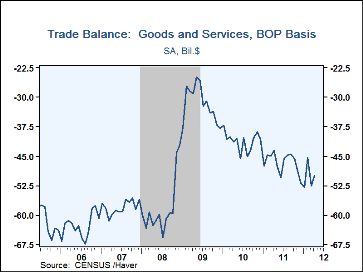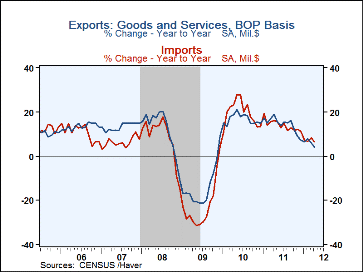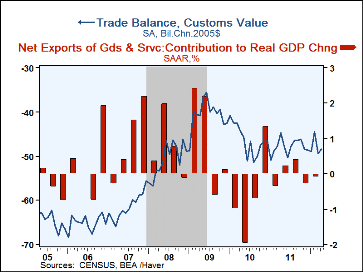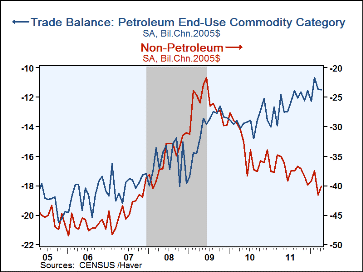 Global| Jun 08 2012
Global| Jun 08 2012U.S. Trade Deficit Narrows Slightly
by:Tom Moeller
|in:Economy in Brief
Summary
The U.S. foreign trade deficit during April narrowed marginally to $50.1B from a revised $52.6B in March, last month reported as $51.8B. Figures back to January 2009 were revised. Expectations were for a deficit of $49.5B. Exports [...]
The U.S. foreign trade deficit during April narrowed marginally to $50.1B from a revised $52.6B in March, last month reported as $51.8B. Figures back to January 2009 were revised. Expectations were for a deficit of $49.5B. Exports slipped 0.8% (+4.1% y/y) and imports fell 1.7% (+6.3% y/y). In chained 2005 dollars, the deficit in goods deepened to $48.5B in April from $49.5B. Real exports fell 1.5% (+3.0% y/y) and real imports fell 1.6% (+4.7% y/y).
Overall U.S. exports slipped 0.8% (+4.1% y/y) while goods exports fell 1.1% (+4.0% y/y). Capital goods exports were off 3.3% (+5.3% y/y) and industrial supplies & materials declined 2.3% (+0.5% y/y). These drops were offset by foods, feeds & beverages which jumped 6.9% (0.5% y/y), autos & parts, up 3.6% (15.5% y/y), and nonauto consumer goods exports which added 1.4% (2.9% y/y). Services exports slipped 0.1% (+4.3% y/y). Travel exports eased 0.1% (+11.4% y/y) as fewer individuals visited the U.S. but passenger fares ticked up 0.1% (14.7% y/y).
Total imports fell 1.7% (+6.3% y/y) in April as goods imports fell 2.0% (+6.4% y/y). The decline was broad-based amongst categories including a 4.2% drop (+9.5% y/y) in capital goods, a 1.1% shortfall in nonauto consumer goods (-0.7% y/y) and a 1.5% decline (+26.8% y/y) in autos & parts. Imports of services ticked up 0.1% (6.8% y/y); travel imports slipped 0.6% (+9.3% y/y) due to fewer U.S. citizens traveling abroad while passenger fares fell 1.7% (+18.2% y/y).
The value of petroleum imports in April fell 1.2% (+5.6% y/y) and when adjusted for prices, imports slipped 0.5% (-0.7% y/y). The average cost of crude oil per barrel rose m/m to $109.94, up from $103.19 twelve months earlier. The quantity of energy-related petroleum imports was down 2.2% y/y, +4.0% y/y in value.
By country, the April goods trade deficit with mainland China deteriorated y/y to $24.6B. Exports to China jumped 5.7% y/y, however, U.S. imports surged 11.6% y/y. With Japan, the deficit nearly doubled y/y to $6.3B as exports rose 11.1% y/y but U.S. imports jumped by more than one-third y/y. The deficit with the European Union deepened y/y to $8.7B with a 2.9% y/y decline in exports to Europe and a 0.4% slip in imports.
The international trade data can be found in Haver's USECON database. Detailed figures are available in the USINT database. The expectations figures are from the Action Economics consensus survey, which is carried in the AS1REPNA.
Monetary Policy: Recurring Themes is the title of this week's speech by Charles L. Evans, President & CEO of the Federal Reserve Bank of Chicago and it can be found here.
| Foreign Trade | Apr | Mar | Feb | Y/Y | 2011 | 2010 | 2009 |
|---|---|---|---|---|---|---|---|
| U.S. Trade Deficit | $50.1B | $52.6B | $45.4B | $43.6B (4/11) |
$559.9B | $494.7B | $381.3B |
| Exports (%) | -0.8 | 2.5 | 0.8 | 4.1 | 14.2 | 16.7 | -14.5 |
| Imports | -1.7 | 5.2 | -2.6 | 6.3 | 13.9 | 19.5 | -23.0 |
| Petroleum | -1.2 | 8.8 | -8.9 | 5.6 | 30.8 | 32.5 | -44.0 |
| Nonpetroleum goods | -2.2 | 5.3 | -1.7 | 6.6 | 12.1 | 20.8 | -20.9 |
Tom Moeller
AuthorMore in Author Profile »Prior to joining Haver Analytics in 2000, Mr. Moeller worked as the Economist at Chancellor Capital Management from 1985 to 1999. There, he developed comprehensive economic forecasts and interpreted economic data for equity and fixed income portfolio managers. Also at Chancellor, Mr. Moeller worked as an equity analyst and was responsible for researching and rating companies in the economically sensitive automobile and housing industries for investment in Chancellor’s equity portfolio. Prior to joining Chancellor, Mr. Moeller was an Economist at Citibank from 1979 to 1984. He also analyzed pricing behavior in the metals industry for the Council on Wage and Price Stability in Washington, D.C. In 1999, Mr. Moeller received the award for most accurate forecast from the Forecasters' Club of New York. From 1990 to 1992 he was President of the New York Association for Business Economists. Mr. Moeller earned an M.B.A. in Finance from Fordham University, where he graduated in 1987. He holds a Bachelor of Arts in Economics from George Washington University.
More Economy in Brief
 Global| Feb 05 2026
Global| Feb 05 2026Charts of the Week: Balanced Policy, Resilient Data and AI Narratives
by:Andrew Cates










